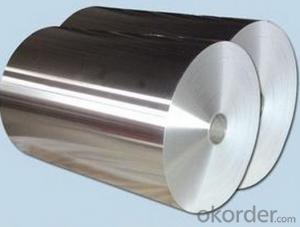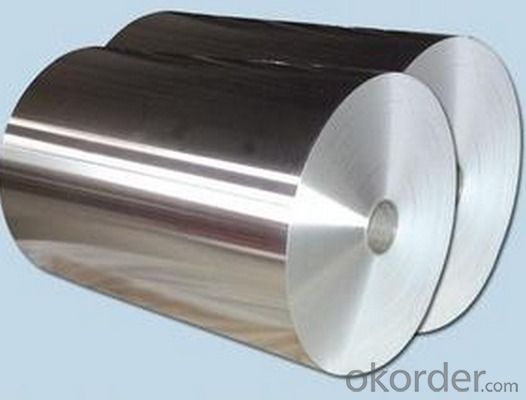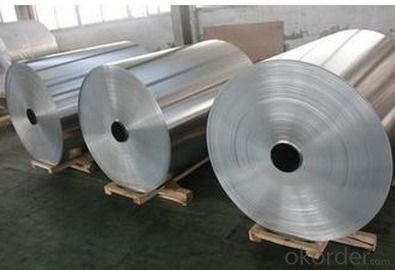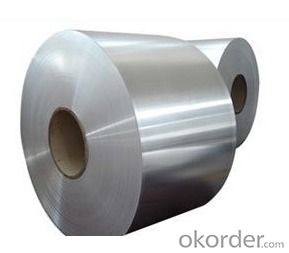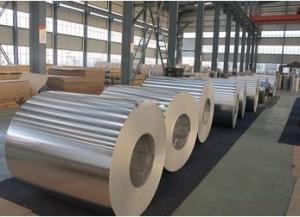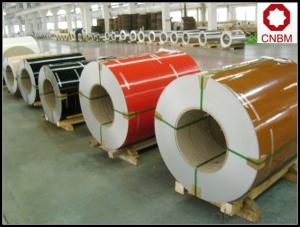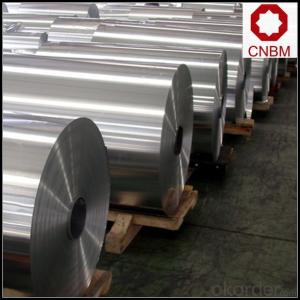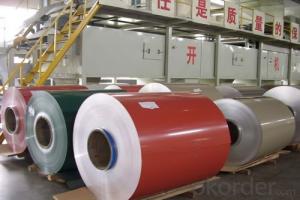6061 Aluminum Coil 1100 H14 for Composite Panel
- Loading Port:
- Shanghai
- Payment Terms:
- TT OR LC
- Min Order Qty:
- 1 m.t.
- Supply Capability:
- 5000 m.t./month
OKorder Service Pledge
OKorder Financial Service
You Might Also Like
Specification
Product Description:
Alloy:1100
Temper: O H12 H14 H16 H18 H24
Thickness(mm):0.2-10mm
Width(mm):100-2500
Length(mm):800-13000
Delivery lead time: 20-25 days
Packing: wooden/veneer pallet, wooden/veneer case
Unit Price/Payment: FOB, CIF, CFR,CNF
Payment term: TT, LC at sight, Westen union
Country of origin: China
Certificate approved: ISO9001, SGS,ASTM, ENAW
MOQ: 2.0-2.5 metric ton per size
Advantages
1.Anticorrosion and antirust
2. High credit and quality :SGS,ISO9001:2008
3. Professional manufacture and control
4. Prompt delivery
1100 Chemistry Composition | |||||||||
Element | Si | Fe | Cu | Mn | Mg | Cr | Ti | Zn | Al |
Standard Value | 0.25 | 0.40 | 0.05 | 0.05 | 0.05 | --- | 0.03 | 0.05 | remain |
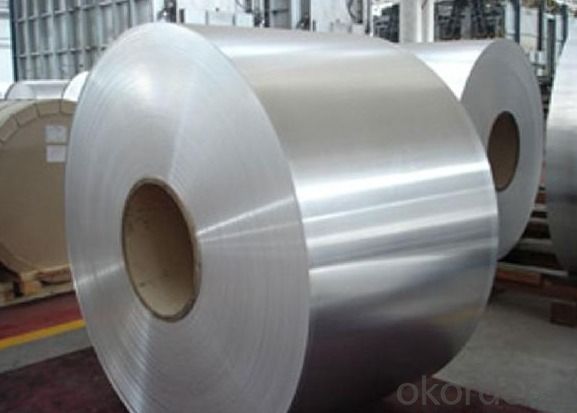
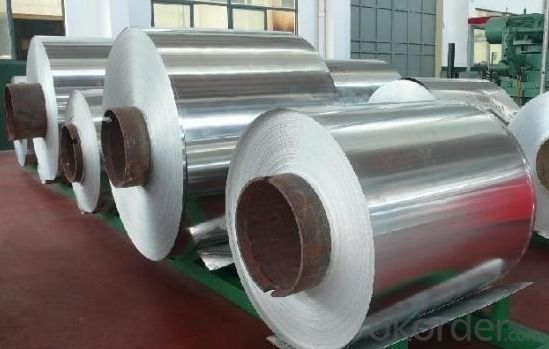
1100 Aluminum Coil
Low strength aluminum alloy has excellent corrosion resistance and satisfactory anodizing and conversion coating finishing characteristics. It is unmatched by any other commercial aluminum alloy in workability. Readily to welding, brazing, and soldering. Machinability is poor and tends to be "gummy". Non-heat treatable. Typical applications include chemical storage, processing equipment, kitchen utensils, and LED for channel letter ,general sheet metal work .
FAQ of Aluminium Coil 1100 h14 for composite panel:
1.Superior quality of raw material.
2.Reasonable and stable chemical composition.
3.Accurate tolerance.
4.Goode mechanical property.
5.We have the certificate of ISO9001.
- Q: Can aluminum coils be used in automotive body panels?
- Automotive body panels can indeed utilize aluminum coils. Being both lightweight and corrosion-resistant, aluminum proves to be a suitable material for automotive purposes. The employment of aluminum coils in body panels yields numerous benefits, such as enhanced fuel efficiency owing to the reduced vehicle weight, improved handling and maneuverability, and increased durability. Moreover, aluminum boasts high recyclability, rendering it an environmentally conscious alternative for automotive production. Numerous automakers have already begun integrating aluminum coils into their vehicles, and this trend is anticipated to persist as the industry aims for lighter and more environmentally sustainable automobiles.
- Q: What are the different grades of aluminum used in coil production?
- Coil production utilizes various grades of aluminum, each possessing its own unique properties and characteristics suitable for specific purposes. Some commonly employed grades include: 1. Commercially pure aluminum, known as 1100 Aluminum, excels in corrosion resistance and boasts high thermal conductivity. It finds applications in heat exchangers, fin stock, and evaporator coils. 2. 3003 Aluminum, alloyed with manganese, offers increased strength and durability compared to 1100 aluminum. Its formability and weldability properties make it suitable for a wide range of coil production applications, such as roofing, gutters, and general sheet metal work. 3. Magnesium alloyed 5052 Aluminum exhibits exceptional corrosion resistance and high strength. It is frequently utilized in marine applications like boat hulls and components, as well as architectural and automotive applications. 4. Renowned for its high strength and excellent machinability, 6061 Aluminum is considered one of the most versatile aluminum alloys. It commonly finds use in structural applications like aircraft parts, truck frames, and industrial equipment. 5. The aerospace and defense industries commonly rely on 7075 Aluminum, which offers one of the highest strength aluminum alloys. It demonstrates excellent fatigue resistance and is often employed in the production of aircraft wing spars, fuselage frames, and missile components. These examples highlight the diverse grades of aluminum employed in coil production. The selection of a specific grade depends on the desired properties and requirements of the intended application.
- Q: What is the typical heat transfer coefficient for aluminum coils?
- The heat transfer coefficient for aluminum coils can vary depending on several factors, including the application, coil geometry, and surrounding conditions. Generally, aluminum has high thermal conductivity, which enables efficient heat conduction. In forced convection applications, where heat is transferred using a fluid like air or water, the heat transfer coefficient for aluminum coils can range from 10 to 100 W/m^2K. This range is influenced by factors such as flow rate, velocity, and temperature difference between the coil and the fluid. In natural convection scenarios, where heat transfer occurs due to the buoyancy-driven flow of air, the heat transfer coefficient for aluminum coils is typically lower, ranging from 5 to 25 W/m^2K. This is because the movement of air is slower and the heat transfer effectiveness is reduced compared to forced convection. It's important to note that these values are general guidelines and can vary significantly depending on specific design considerations, material properties, and operating conditions. Therefore, it is recommended to consult specific heat transfer data or conduct detailed experiments or simulations to determine the precise heat transfer coefficient for a given aluminum coil application.
- Q: Is there any way aluminum can affect you if its absorbed into your body either by digestion, through an open cut, or even through breathing it in?Most likely inhaling it would surely affect you, but what about the other two?
- Aluminium can accumulate in the brain possibly causing alzheimers. If you inhaled it it would poison you and damage your lungs, if you got it in your body it would damage your skin, possibly cause an infection and the cut might not heal. Aluminium is a solid so how could you accidently get it in your body unless you have been melting it etc? If it wasn't solid it would burn you if you got it on your skin. You can only inhale vapours not a metal. If you ate it then it would probably damage or clog up your insides otherwise just pass out in a stool, depends how much you ate. People eat from aluminium and touch it every day so it is not dangerous to be in contact with.
- Q: What are the common surface defects found in aluminum coils?
- Surface defects commonly found in aluminum coils include various issues such as scratches, dents, corrosion, streaking, oxide spots, oil stains, and roll marks. Scratches are visible lines or marks that can occur during handling, transportation, or processing, impacting both the appearance and functionality of the coil. Dents are depressions or deformations that can result from mishandling or impact during transportation or storage, affecting the coil's structural integrity and aesthetics. Corrosion, which can appear as pitting, discoloration, or roughness, is a concern in environments with high moisture levels or exposure to chemicals, weakening the coil and compromising performance. Streaking, thin lines or bands on the surface, may indicate uneven coating or surface contamination, potentially pointing to manufacturing issues. Oxide spots are small discolored areas caused by aluminum oxide formation during processing or storage, mainly affecting aesthetics. Oil stains are greasy or oily marks resulting from improper cleaning or handling, impacting coating adhesion and requiring additional cleaning or treatment. Roll marks, elongated depressions or raised lines caused by the rolling process, are generally unavoidable but excessive or severe instances can negatively affect appearance and quality. Implementing proper quality control measures, handling techniques, and storage practices can help minimize or prevent these surface defects in aluminum coils.
- Q: Can aluminum coils be used in the production of architectural façades?
- Yes, aluminum coils can be used in the production of architectural façades. Aluminum is a popular choice for façades due to its lightweight nature, durability, and versatility. Aluminum coils can be easily formed and shaped to create various architectural designs, making them suitable for use in the construction of façades.
- Q: Hey! I have an Aluminum MacBook (2.4 GHz Core 2 Duo, 9400m graphics processor), and I'm wondering whether it's worth updating to the new 2011 13 MacBook Pro. I'm mainly looking for two things: 1. What would be the difference between the 2.4 GHz Core 2 Duo, and the 2.3 GHz i5, and 2. What would be the difference between the 9400m and the HD 3000 Graphics?Thanks! :)
- THIS ONE IS BEST ACCORDING TO YOUR REQUIREMENT Apple MacBook Pro MC700LL/A 13.3-Inch Laptop *13.3-inch LED-backlit glossy widescreen display with edge-to-edge, uninterrupted glass (1280 x 800-pixel resolution). *2.3 GHz Intel Core i5 dual-core processor (Sandy Bridge) with 3 MB shared L3 cache for excellent multitasking. *Intel HD Graphics 3000 with 384 MB of DDR3 SDRAM shared with main memory. *320 GB Serial ATA hard drive (5400 RPM) *4 GB installed RAM (1333 MHz DDR3; supports up to 8 GB) *8x slot-loading SuperDrive with double-layer DVD support (DVD±R DL/DVD±RW/CD-RW) *Built-in FaceTime HD camera for video chatting *Wi-Fi wireless networking (based on 802.11n specification; 802.11a/b/g compatible) *Gigabit Ethernet wired networking (10/100/1000) *Bluetooth 2.1 + EDR (Enhanced Data Rate) for connecting with peripherals such as keyboards, mice and cell phones *Two USB 2.0 ports, one FireWire 800 port *SDXC card slot *Thunderbolt port with native Mini DisplayPort output plus support for DVI, VGA, dual-link DVI, and HDMI (requires adapters, sold separately) *Multi-Touch trackpad for precise cursor control with support for inertial scrolling, pinch, rotate, swipe, three-finger swipe, four-finger swipe, tap, double-tap, and drag capabilities *Full-size backlit keyboard *Stereo speakers with subwoofers *Dimensions: 12.78 x 8.94 x 0.95 inches (WxDxH) *Weight: 4.5 pounds *Up to 7 hours of battery life *Meets Energy Star 5.0 requirements *Rated EPEAT Gold
- Q: This question asks about the environmental effects that aluminum coils may have on the environment.
- <p>The environmental impacts of aluminum coils are multifaceted. Aluminum production, particularly the extraction and refining process, consumes significant energy and can result in greenhouse gas emissions. The mining of bauxite, the primary source of aluminum, can lead to deforestation and habitat destruction. However, aluminum coils are recyclable, which reduces their environmental footprint compared to non-recyclable materials. When recycled, aluminum saves up to 95% of the energy needed to produce new aluminum, reducing emissions and waste. Despite these benefits, improper disposal or incineration of aluminum can still contribute to pollution. Overall, the environmental impact of aluminum coils is complex, with both negative and positive aspects depending on production methods and waste management practices.</p>
- Q: I would like to order 25 micron diameter 99.99% Aluminum wire required to use for making electrical connections. Only several cm are needed, so I would like to purchase a small spool. Delivery ASAP preferable (overnight or two day shipping would be best). This wire will be attached by hand using epoxy and not using a wire bonder.
- If they can't help, try asking the tech support guys at the wirebond manufacturers and the tool manufacturers. KS in the US and Shinkawa in Japan used to be the big guys. You can search for ultrasonic bond tools. You can also check with superconducting research centers; several private and public ones. Researchers might loan you materials and/or bonding support. BTW, Al critical temp is reportedly about 1.2°K, pretty tough to get that cold! U/S bond wire has 1% silicon, partly for hardness, you can probably bond pure wire though. Key is breaking up the oxide. Maybe bonding at cold temps and/or in vacuum would work. Also, I doubt epoxy would be good or superconducting at the temps. Al filled epoxy is unreliable electrical conductor due to oxide formation. Will be a bear to handle such fine wires without a bonder! Good luck!
- Q: What are the potential safety hazards when using a soldering iron on copper or aluminum coils?
- <p>Using a soldering iron to solder copper or aluminum coils can pose safety risks. Copper and aluminum can react when joined, potentially leading to a galvanic corrosion. Additionally, the high heat from the soldering iron can cause the metal to expand or deform, especially if not handled properly. Always ensure proper ventilation to avoid inhaling fumes from the soldering process. Wear heat-resistant gloves and safety glasses to protect against burns and flying debris. Ensure the work area is clear of flammable materials to prevent fire hazards.</p>
Send your message to us
6061 Aluminum Coil 1100 H14 for Composite Panel
- Loading Port:
- Shanghai
- Payment Terms:
- TT OR LC
- Min Order Qty:
- 1 m.t.
- Supply Capability:
- 5000 m.t./month
OKorder Service Pledge
OKorder Financial Service
Similar products
Hot products
Hot Searches
Related keywords
